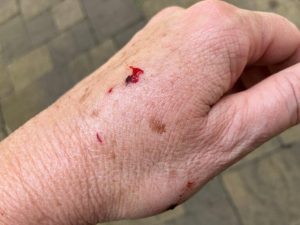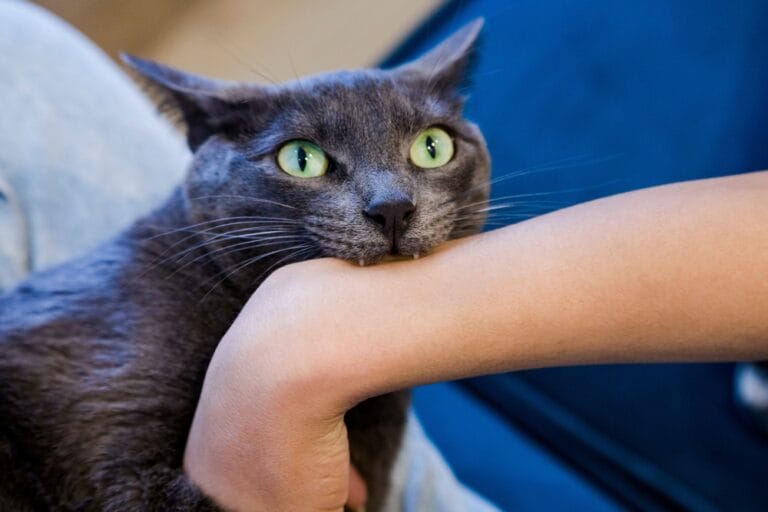Every person who has ever owned a cat is aware of how wonderfully weird they can be. My former cat used to play, hunt mice, and sleep with me.
However, he would bite me a bit now and then, not very frequently, but always unexpectedly. Does your cat bite you also? What it may mean is this:
When a cat bites you, it may mean something different depending on the situation and the type of bite. The following are some of the common reasons…

Playfulness
Cats are playful animals and, of course, they require space to explore the world. Cats may also bite during play, but this is usually a gentle bite when they are over stimulated. These are not aggressive nips and are normally not breaking the skin, although we all know that they can still hurt!
Love Bites
It is not uncommon that your cat nibbles you a bit here and there, especially when they really like you. It is simply their way of telling you that you have done a great job! Cats can also bite gently and softly as a sign of affection. This usually occurs when they are purring or when they are being petted.
They can be saying, I am enjoying this interaction but it is too much to me. I am getting to my limit, says Samantha Bell, a cat expert with Best Friends Animal Society.
A hungry cat may also nip playfully as a sign of requesting food. Likewise, the loving nibbles may also be a kind of request by a cat to be given more attention or love. Instead of being an indication of aggression, these nibbles are normally a cat displaying its needs and strengthening its relationship with its owner.
Overstimulation
Cats are also prone to being overwhelmed by too many sensations just like us. They may not be able to handle all their feelings at the same time, and they may behave in a manner that is not typical of them. The same applies to cats. Other cats get overstimulated when they are pet too much or given too much attention. They can bite you to show that they want some space.

Fear or stress
This is most likely the first thing that will come to mind of anyone who has been bitten by a cat. And it is a natural defense mechanism of all felines. When a cat is threatened or scared, it can bite in order to defend itself.
Discomfort or pain
Not all people know that a cat bite might indicate a more severe condition. In case a cat bites without warning, it might be because of pain or sickness. An underlying health problem can be eliminated with a vet check-up.
Territorial behavior
Cats are territorial creatures by nature and biting is a common method of them establishing dominance or defending their territory. It could be their favorite place on the couch, a favorite toy, or even a particular place in the house that they think of as their own, but a cat may bite to protect what they perceive as their own territory. This is normally an action of being threatened or insecure and it is important to remember that cats, just like their wild counterparts, still possess powerful instincts to defend their habitat.
Kittens and young cats
Kittens and young cats are playful and energetic, and they may bite their owners hands or feet in the process of rough play.
Although this can be cute and harmless when they are little, it is worth noting that promoting such play can have a long-term effect. Play teaches kittens how to interact with their surroundings and social limits, and when they are permitted to bite hands or feet in their first months, they can continue to do so as adults.
As cats mature, their bites may be more intense and painful, and they may hurt their human friends. To avoid this, it is important to channel their playful nature to the right toys and activities and make them understand that hands and feet are not toys. Setting these limits at an early age will help you to make sure that your cat will become a well-behaved adult, and the chance of getting injured will be minimal, and the interaction with your feline friend will be more pleasant.

Treatment of a cat bite
Bites by cats, particularly deeper ones, can be very dangerous to human beings and animals. This is because of the bacteria in the mouth of a cat which may be dangerous when it enters the bloodstream or an open wound.
Their sharp teeth can easily pierce through the skin and these bacteria may enter the underlying tissues. This may cause severe infections and complications, and it is necessary to treat cat bites in a timely and efficient manner to avoid additional health problems.

Therefore, in case of an accident, it is important to act immediately to treat the wound. Begin by cleaning the area using mild soap and running water. Then, use antiseptic solution to prevent infection. Lastly, apply a clean sterile bandage over the wound to prevent further contamination.
